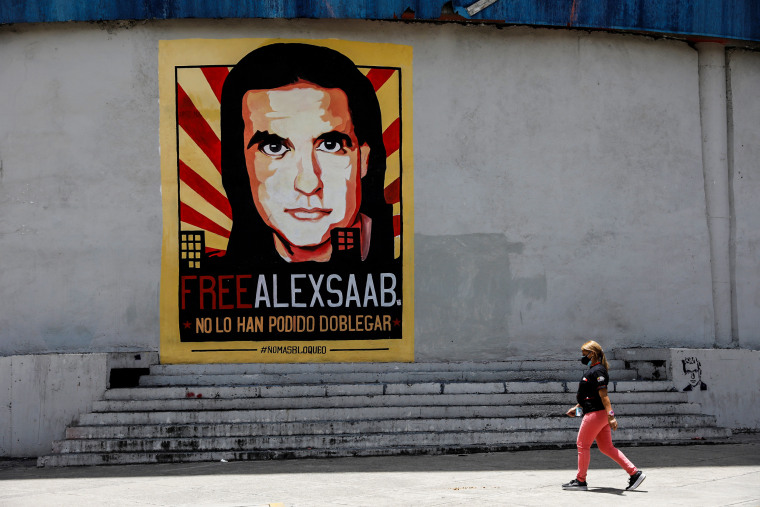Alex Saab, a Colombian businessman accused of laundering money on behalf of Venezuela’s government, is expected to plead not guilty in U.S. court on Monday in an alleged bribery case that pits Washington against President Nicolas Maduro’s socialist administration.
The case has prompted strong condemnation from Maduro, strained relations between Venezuela and the United States, and disrupted nascent talks between Venezuela’s government and the opposition. Here are some details:
What are the political implications?
When a Cape Verde court ruled in September that Saab’s extradition to the United States could proceed, Venezuela named him as a member of the government’s delegation to the Norway-mediated negotiations with the South American country’s political opposition, which were underway in Mexico.
Hours after Saab was extradited on Oct. 16, the government said it would suspend the talks.
The negotiations came as a nearly three-year push to oust Maduro by opposition leader Juan Guaido — recognized by dozens of countries as Venezuela’s rightful president — lost steam.
Maduro has called Guaido a U.S. puppet. His allies see Saab’s extradition as a sign that Washington — despite publicly backing the negotiations as a peaceful path to resolving Venezuela’s crisis — is continuing its push for regime change.
The United States says its judicial and diplomatic systems operate independently. The opposition has urged Maduro to resume the talks.
What are prosecutors' accusations?
U.S. prosecutors have charged Saab, 49, with siphoning around $350 million out of Venezuela through the United States as part of a bribery scheme linked to Venezuela’s state-controlled exchange rate.
The Department of Justice alleges that between at least 2011 and 2015, Saab and an associate laundered money through a scheme involving building low-income housing in Venezuela.
They are accused of submitting “false and fraudulent” documents for items that were never imported. By bribing Venezuelan government officials, they secured payment in U.S. dollars at a favorable rate via the government-controlled currency exchange rate, according to the 2019 indictment.
What does his defense say?
Saab’s U.S. defense attorneys have called the housing corruption charges a “cryptically alleged scheme” and said their client denied the allegations.
“Mr. Saab denies this scheme and all allegations of the indictment concerning it or any conspiracy, bribery, or money laundering of any kind,” Saab’s attorneys wrote in a Jan. 21 court filing.
His lawyers have said Saab was a Venezuelan diplomat and thus entitled to immunity. Court records show that Venezuela’s foreign ministry named Saab a special envoy in April 2018, and tasked him with a mission to seek aid from Iran in 2020.
Why is this case so high-profile?
The Treasury Department sanctioned Saab in 2019, alleging he bribed Maduro’s relatives to win no-bid, overvalued contracts to import food for a government-run handout program as hunger surged in Venezuela.
In the last couple years, Saab emerged as a key broker in helping Caracas bypass U.S. sanctions in order to import goods, including Iranian gasoline to help resolve a fuels shortage.
“When things got tough, Mr. Alex Saab was one of the few who said he was willing,” Socialist Party Vice President Diosdado Cabello said in October.
Saab’s arrest was celebrated by Venezuela’s opposition, which is hoping he cooperates with investigators and sheds light on what they say has been widespread graft in the oil-rich nation, as well as details about how the Maduro government obtains the resources to remain in power despite economic pressure.
The United States has labeled Maduro an illegitimate dictator and has sanctioned the OPEC nation’s state oil company in a bid to pressure him to step down. Several top Venezuelan officials, including Maduro himself, face U.S. drug trafficking charges. Maduro has denied and ridiculed the allegations.
The dramatic nature of Saab’s arrest has also drawn attention. Saab was detained in Cape Verde on a U.S. warrant in mid-2020 while his plane was refueling en route to Iran. He was extradited to Florida in October. Saab’s family says he has been “kidnapped.”
What's next in the court case?
Saab will not bow down to the United States, said his Caracas-based wife Camila Fabri, an Italian national. Fabri is under investigation by Italy’s Guardia di Finanza for possible money laundering linked to Saab, according to a person familiar with the investigation.
Fabri could not immediately be reached for comment.
Estimating a precise time frame for a trial is difficult, said Stef Cassella, a former federal prosecutor.
“Unless there’s an early guilty plea, which would be surprising, I wouldn’t expect much to happen for several months,” he said.
